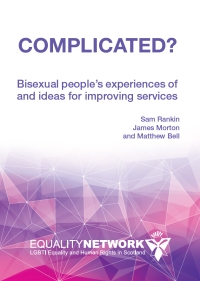British Bisexuality: Purple Prose out now!
07/09/2016
Meg-John Barker reflects on the awesome new book on British Bisexuality…
Last week saw the launch of a book project that I’m very excited to be part of: Purple Prose.
This collection, edited by Kate Harrad, brings together experiences from a diverse spectrum of bisexual folk in Britain today. It works as a how-to guide to British bi communities and identities, as well as providing a fascinating insight into the wide range of experiences under the bisexual umbrella.
A particular strength of the book is its focus on intersectionality. Most writing on bisexuality, including The Bisexuality Report which I was part of, focus on bisexual people as a fairly unified group: how they are represented, the challenges they face, bi-specific discrimination, etc. The problem with this approach is that bisexual experiences – like all experiences – are very different depending on other intersecting aspects of identity and experience such as gender, class, race, disability, geographical location, generation. Also, as Shiri Eisner points out, there are vital links between bisexual activism and feminist, trans and queer activism, anti-racism, and other anti-oppression movements, which are vital to attend to because a single-issue kind of activism can’t get us very far.
For these reasons it’s great to see a book in which at least half of the chapters are devoted to specific intersections (e.g. ‘Bisexual and disabled’, ‘Bisexual Black and Minority Ethic People‘, ‘Bisexuals and Faith’).
Even within these chapters there is a clear sense of the range of experiences that exist amongst any specific group, such as older bisexual people or non-monogamous bis, for example. In the chapter that I co-edited with Fred Langdridge, ‘The Gender Agenda’, we decided to foreground the experiences of non-binary bisexual people, given that there are already books about bisexual women and bisexual men, but none on this topic. While we included the voices of bisexual people of many genders, we gave specific attention to those who are non-binary in terms of both their sexuality and their gender. Even within that group we discovered many differences in relation to how they related to the term ‘bisexual’, how they experienced their gender and sexuality, whether these things changed over time or not, and how they were navigated in their close relationships and communities.
We still have a long way to go on bisexuality in Britain given that the biggest group under the LGBT umbrella still has the highest rate of mental health problems, and gets the least attention in policy and practice, both outside and within the LGBT sector. Purple Prose is definitely a step in the right direction.






You must be logged in to post a comment.